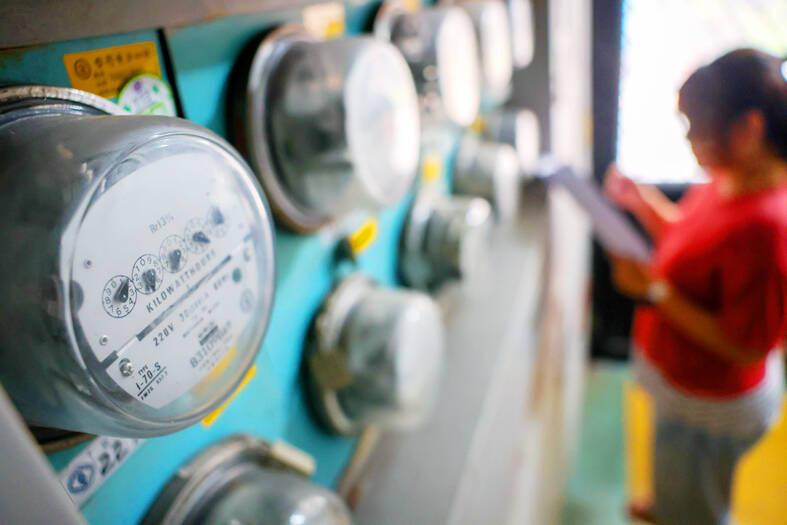An internal report of state-owned Taiwan Power Co (Taipower, 台電) showed that the company is seeking government approval to raise electricity rates by almost 6 percent on average to make up for huge losses.
The Ministry of Economic Affairs would next week hold a power rate assessment review meeting to discuss whether Taipower would be allowed to hike electricity rates next month.
The state-run company has shouldered NT$422.9 billion (US$12.82 billion) in accumulated losses.

Photo: CNA
To prevent further losses, the company needs to generate an additional NT$50 billion in revenue this year through electricity rate hikes, Taipower said.
Its report showed that rates for household users and small businesses, which consume less than 330 kilowatt-hours (kWh) a month, would be raised by 11 to 33 percent.
Bills for household users and small businesses that consume more than 330kWh a month would rise no more than 10 percent under a progressive tariff mechanism, the report showed.
Rates for the industrial sector are expected to be raised no more than 5 percent, it said.
The measures would bring average rate hikes to almost 6 percent as a whole, it said.
Taipower considered rate increases after the Legislative Yuan cut the general government budget plan, including two NT$100 billion subsidy projects for the power company, as well as other subsidies that would be added to its construction funds for outlying islands, the utility said.
Earlier this week, Minister of Economic Affairs J.W. Kuo (郭智輝) said the ministry would account for the rate hikes effects on inflation, adding that the government is determined to keep the local consumer price index (CPI) from rising more than 2 percent, an alert level set by the central bank.
In the first two months of this year, the CPI grew 2.12 percent, while the Directorate-General of Budget, Accounting and Statistics late last month forecast that inflation would reach 1.94 percent this year.
The rate hikes aim to allow the power supplier to sell electricity at a price closer to its costs, the Taipower report said.
Taipower chairman Tseng Wen-sheng (曾文生) had said he hoped the local electricity rate structure would be more reasonable, particularly for smaller households and business users.
If the rate hike plan is approved in the Ministry of Economic Affairs’ power rate review meeting, about 13.6 million households and 910,000 small businesses would be affected, Taipower said.
The rates for industrial users, regardless of whether they are high-voltage users such as contract chipmaker Taiwan Semiconductor Manufacturing Co (台積電) or other companies, are expected to rise, it added.
Despite the electricity rate increases, it is unlikely that the company would break even this year, as it has to consider the effect of inflation on household users and the competitiveness of Taiwan’s industries, it said.

‘FORM OF PROTEST’: The German Institute Taipei said it was ‘shocked’ to see Nazi symbolism used in connection with political aims as it condemned the incident Sung Chien-liang (宋建樑), who led efforts to recall Democratic Progressive Party (DPP) Legislator Lee Kun-cheng (李坤城), was released on bail of NT$80,000 yesterday amid an outcry over a Nazi armband he wore to questioning the night before. Sung arrived at the New Taipei City District Prosecutors’ Office for questioning in a recall petition forgery case on Tuesday night wearing a red armband bearing a swastika, carrying a copy of Adolf Hitler’s Mein Kampf and giving a Nazi salute. Sung left the building at 1:15am without the armband and apparently covering the book with a coat. This is a serious international scandal and Chinese

PERSONAL DATA: The implicated KMT members allegedly compiled their petitions by copying names from party lists without the consent of the people concerned Judicial authorities searched six locations yesterday and questioned six people, including one elderly Chinese Nationalist Party (KMT) member and five KMT Youth League associates, about alleged signature forgery and fraud relating to their recall efforts against two Democratic Progressive Party (DPP) legislators. After launching a probe into alleged signature forgery and related fraud in the KMT’s recall effort, prosecutors received a number of complaints, including about one petition that had 1,748 signatures of voters whose family members said they had already passed away, and also voters who said they did not approve the use of their name, Taipei Deputy Chief Prosecutor

UNDER ATTACK: Raymond Greene said there were 412 billion malicious threats in the Asia-Pacific region in the first half of 2023, with 55 percent targeting Taiwan Taiwan not only faces military intimidation from China, but is also on the front line of global cybersecurity threats, and it is taking action to counter those attacks, President William Lai (賴清德) said yesterday. Speaking at the opening of this year’s Cybersec Expo in Taipei, the president assured foreign diplomats and exhibitors that Taiwan remained committed to strengthening its defense against cyberattacks and enhancing the resilience of its digital infrastructure. Lai referenced a report from the National Security Bureau (NSB) indicating that the Government Service Network faced an average of 2.4 million intrusion attempts daily last year, more than double the figure

COUNTERINTELLIGENCE TRAINING: The ministry said 87.5 percent of the apprehended Chinese agents were reported by service members they tried to lure into becoming spies Taiwanese organized crime, illegal money lenders, temples and civic groups are complicit in Beijing’s infiltration of the armed forces, the Ministry of National Defense (MND) said in a report yesterday. Retired service members who had been turned to Beijing’s cause mainly relied on those channels to infiltrate the Taiwanese military, according to the report to be submitted to lawmakers ahead of tomorrow’s hearing on Chinese espionage in the military. Chinese intelligence typically used blackmail, Internet-based communications, bribery or debts to loan sharks to leverage active service personnel to do its bidding, it said. China’s main goals are to collect intelligence, and develop a